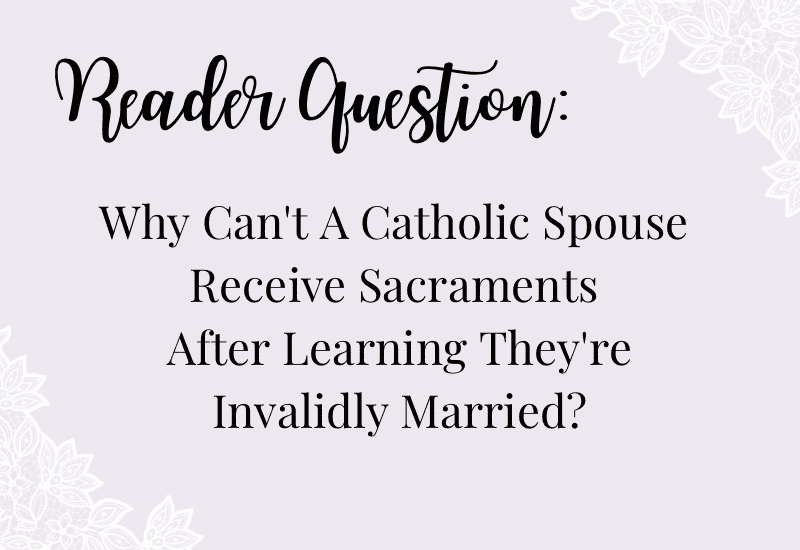I’ve been helping a lot of folks to the best of my abilities in my DMs, comments, email, etc. So I figured I would share some of those answers with you!
Question: Hi! My husband is Catholic, however, I am not, I am non-denominational. We recently got married in a small ceremony without a priest. When we told the church that we got married they informed my husband that he is not allowed to receive any sacraments until after our marriage is reconciled- including confession. Is this accurate? I cannot understand for the life of me why he would be unable to go to confession!
This is really an excellent question. It’s one of the first things we went over at the Rite of Christian Initiation for Adults (RCIA) class. They wanted to make sure that as we discerned converting to Catholicism that we were prepared to do all the things we needed to to live according to the Catholic faith.
Here’s my answer:
Disclaimer: I’m not a canon lawyer or a priest, but I think I can give you the gist of what’s going on.
I’m assuming the priest you talked to said your husband can’t go to confession since y’all’s marriage skipped some of the important steps that mixed denomination couples getting married have to take—namely: receiving permission from the bishop to be married to you (a non-Catholic) & to be married somewhere other than a Catholic Church.
“If the non-Catholic is a baptized Christian (not necessarily Catholic), the marriage is valid as long as the Catholic party obtains official permission from the diocese to enter into the marriage and follows all the stipulations for a Catholic wedding.
Because Catholics regard marriage as a sacred event, the church prefers that ecumenical interfaith couples marry in a Catholic church, preferably the Catholic party’s parish church. If they wish to marry elsewhere, they must get permission from the local bishop. He can permit them to marry in the non-Catholic spouse’s place of worship or another suitable place with a minister, rabbi, or civil magistrate – if they have a good reason, according to the U.S. Conference of Catholic Bishops. This permission is called a “dispensation from canonical form.” Without it, a wedding not held in a Catholic church is not considered valid” [1].
Because y’all were invalidly married, y’all would need to have that rectified before he receives the sacraments. Because, technically speaking, he is not obeying the commandments of God by living together / having sex / other things the Church (in her wisdom and charity) bars unmarried couples from doing; therefore, he cannot receive the Sacraments. (Because receiving the Sacraments in a state of mortal sin is in itself a grave sin. And *perhaps* because the priest could not confidently grant absolution to your husband if y’all are still living as husband and wife without being validly married.)
He might be able to go to confession if y’all were living separately and abstaining until your marriage is reconciled to the Church, but I believe that is up to the priest!
I know this is a lot and I’m sorry y’all are having to figure this out after your wedding. I’m a convert to Catholicism and I know that all of this probably sounds legalistic and (frankly) heartless.
But the Catholic Church wants the Body of Christ to grow and flourish starting with its base unit—the family.
The good news is: the Church will recognize y’all’s marriage as valid and sacramental (assuming you’re baptized)! This means that the graces poured out upon your marriage and the fruits that come of it will be more plentiful (and likely more natural) than a non-sacramental marriage [2].
“A valid Catholic marriage results from four elements: (1) the spouses are free to marry; (2) they freely exchange their consent; (3) in consenting to marry, they have the intention to marry for life, to be faithful to one another and be open to children; and (4) their consent is given in the presence of two witnesses and before a properly authorized Church minister. Exceptions to the last requirement must be approved by church authority” [1].
#1 protects people from tricking their betrothed into marriage by lying / adultery. #2 protects people from being coerced into marriage. #3 is exactly what it says! #4 is the only stipulation y’all seem to have overlooked.
I hope y’all have a gracious and charitable priest / bishop in your area who will make this process as simple, quick, and faithful as possible. In the meantime, I pray you might both have the courage to consider and trust in the Church’s help and the patience to see your wedding vows (that you 100% meant and promised on your wedding day) through.
Godspeed!
Here are some more resources in case anyone is interested in diving deeper into this topic:
[1]: For Your Marriage; Ecumenical and Interfaith Marriages
[2]: Canon Law Made Easy; Catholics In Non-Sacramental Marriages
This post may contain affiliate links, which means I receive a commission if you choose to make a purchase through one of my links (at no cost to you). See my disclosure for specifics.



Hi there! My husband and I married in a Protestant church.
But at birth I was baptized into the Catholic Faith and had my first holy communion. I was never confirmed b/c my parents divorced and my family fell apart
Years later became a Protestant and was baptized.
Now I’m starting to feel pulled back into the Catholic faith but have no idea of where they will find me on the scale here. I’ve been married for 39 years.
Thank you!
Hi Deena! Thank you for sharing your story and how wonderful you’re feeling called back to the Catholic faith. I would highly recommend visiting Jesus in the Sacrament of the Eucharist often to gain clarity on your call back to the Church and what that process will look like for you and your family (you can visit Jesus at Adoration and attend Mass, but not receive Holy Communion yet).
As long as you were baptized with water and in the “Name of the Father, and of the Son, and of the Holy Spirit,” the Church will likely accept your baptism as valid. So you are certainly a daughter of God! I’ll be praying that He speak into your heart and continue to guide you toward the truth!
I was baptized/confirmed as a Lutheran. I was married in a Catholic Church by a Catholic Priest and a Lutheran Pastor. Me and my wife raised our kids as Catholics. I’ve attended Mass for more than 55 years. I’ve taken Holy Communion for 30 years or more. I feel I’ve learned and understand Catholicism and consider myself Catholic. Do I need to do anything else for the Church to consider me Catholic? What would that be?
Hi Gary,
I would talk to your parish priest! I think you’d typically go through RCIA and be received officially into the Catholic church, which would then mean you could receive other sacraments, like reconciliation and the Eucharist!
That’s beautiful that you and your wife have been together so long and have passed down the faith! In light of this, it’s quite possible that the parish priest could somehow expedite the RCIA process for you!